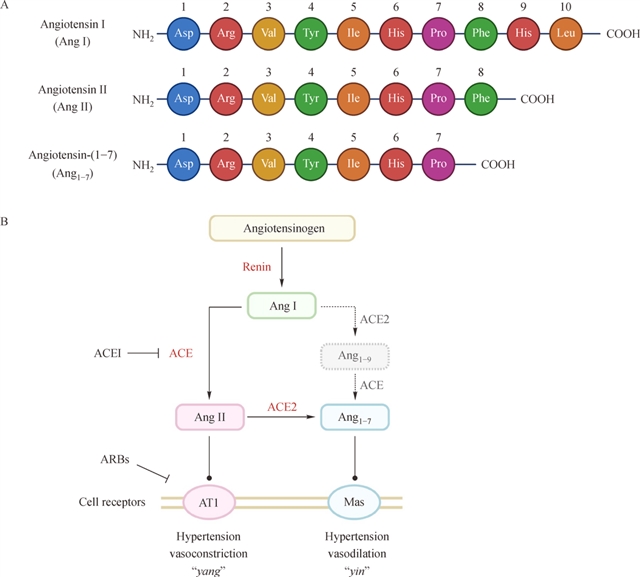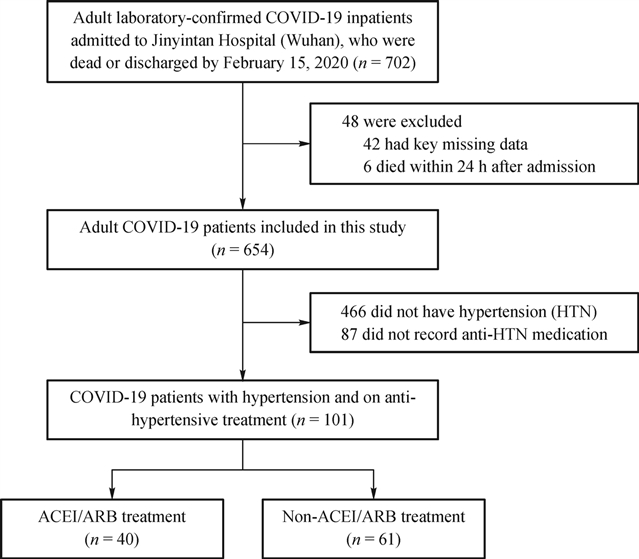论文标题:Use of angiotensin-converting enzyme inhibitors and angiotensin II receptor blockers in context of COVID-19 outbreak: a retrospective analysis (新型冠状病毒肺炎背景下的ACEI/ARB类抗高血压药物用药)
作者:Jiuyang Xu, Chaolin Huang, Guohui Fan, Zhibo Liu, Lianhan Shang, Fei Zhou, Yeming Wang, Jiapei Yu, Luning Yang, Ke Xie, Zhisheng Huang, Lixue Huang, Xiaoying Gu, Hui Li, Yi Zhang, Yimin Wang, Frederick G. Hayden, Peter W. Horby, Bin Cao, Chen Wang
发表时间:06 Jul 2020
DOI:10.1007/s11684-020-0800-y
微信链接:点击此处阅读微信文章
导读 清华大学医学院徐九洋、武汉市金银潭医院黄朝林、中日友好医院曹彬和王辰等在Frontiers of Medicine 发表研究论文《COVID-19背景下的ACEI/ARB类抗高血压药物用药:一项回顾性研究》(Use of angiotensin-converting enzyme inhibitors and angiotensin II receptor blockers in context of COVID-19 outbreak: a retrospective analysis)。
自疫情开始以来,高血压和新型冠状病毒肺炎(COVID-19)之间的关系受到广泛的关注。多项回顾性病例分析的结果显示,高血压是COVID-19患者最常见的合并症,并且高血压病史也是COVID-19重症和死亡的危险因素。关于高血压导致COVID-19疾病加重的可能原因,有一种假说认为和抗高血压药物治疗有关:血管紧张素酶抑制剂(ACEI)和血管紧张素II受体拮抗剂(ARB)是两类常用的抗高血压药物,通过调节肾素-血管紧张素-醛固酮(RAS)系统进行血压调节;SARS-CoV-2的受体蛋白ACE2也是RAS系统的组成部分,此前有文献报道使用ACEI/ARB药物使ACE2表达增加,因此可能增加COVID-19的疾病严重程度。另一方面,ACE2本身具有一定的抗炎作用,推测对COVID-19疾病转归可能有保护作用,并且此前研究表明ARB类药物可以改善肺炎患者的预后,因此也有人建议将ARB类药物作为COVID-19的治疗手段之一。

因此,对于既往有高血压病史的COVID-19患者,是否需要停用ACEI/ARB类药物,或者换用其他类型抗高血压药物,是一个亟待解决的问题。虽然美国和欧洲心血管病学会在2020年3-4月都曾发布公告不建议患者盲目停药或换药,但尚无足够临床证据支持。
摘 要 自新型冠状病毒肺炎疫情爆发以来,血管紧张素酶抑制剂(ACEI)和血管紧张素II受体拮抗剂(ARB)类抗高血压药和 COVID-19 的关系受到广泛关注。
研究团队回顾性分析了2019年12月29日至2020年2月15日武汉市金银潭医院收治的702例COVID-19患者临床信息,并筛选出101例既往有高血压病史、正在进行口服降压治疗的COVID-19患者进行回顾性分析。
在101例患者中,有40位接受ACEI/ARB治疗,其余61例患者的治疗方案中不包括ACEI/ARB(以CCB为主)。与非ACEI/ARB组患者相比,ACEI/ARB组患者在年龄、性别、合并症、实验室检查结果中均无明显差异。两组患者出现死亡(28% vs. 34%,P=0.46)、转入ICU(20% vs. 28%,P=0.37)、机械通气(18% vs. 26%,P=0.31),以及ARDS(28% vs. 36%,P=0.37)、急性肾损伤(13% vs. 10%,P=0.93)等严重并发症的比例也都没有统计学差异。在校正了年龄和性别因素之后,研究者未发现长期使用ACEI/ARB改变COVID-19患者死亡、转入ICU和机械通气的风险。研究结论认为,如无其他禁忌,高血压患者COVID-19疫情期间不应停用ACEI/ARB类抗高血压药物。

点 评本研究基于疫情早期的数据,未发现长期ACEI/ARB用药会改变COVID-19患者临床结局。但是,ACEI/ARB组患者出现不良结局和严重并发症的比例在数值上均比非ACEI/ARB低,虽然两组的差距并没有统计学显著性(可能与研究纳入的患者数量有限有关)。
近期国内和国际有多项关于COVID-19疫情中ACEI/ARB用药的回顾性研究结果发表。这些来自全球不同地区的不同设计的临床研究,均未发现长期ACEI/ARB用药增加COVID-19 的发病和不良结局的风险。虽然有待证据级别更高的随机对照临床试验证实,但综合这些回顾性研究的结果,基本可以得出结论:长期使用ACEI/ARB不增加高血压患者COVID-19患病和重症的风险。
目前仍有更多的问题我们还没有明确的答案:长期使用ACEI/ARB类药物是否对COVID-19的发病和疾病转归有保护作用?在COVID-19发病后,短期应用ACEI/ARB类药物是否有治疗作用?ACEI/ARB对于COVID-19的影响在高血压人群、合并其他基础疾病人群(如糖尿病、慢性心衰等)、一般人群中是否相同?ACEI、ARB两类药物分别对于COVID-19的影响是否相同?进一步,对于高血压患者而言,血压控制良好是否对于COVID-19的疾病转归有影响?这些问题都有待更多的回顾性研究、系统综述,以及正在进行中的随机对照临床试验回答。随着COVID-19研究的进一步深入,相信这些问题最终都能得到解答。
摘要
The possible effects of angiotensin-converting enzyme inhibitors (ACEIs) or angiotensin II receptor blockers (ARBs) on COVID-19 disease severity have generated considerable debate. We performed a single-center, retrospective analysis of hospitalized adult COVID-19 patients in Wuhan, China, who had definite clinical outcome (dead or discharged) by February 15, 2020. Patients on anti-hypertensive treatment with or without ACEI/ARB were compared on their clinical characteristics and outcomes. The medical records from 702 patients were screened. Among the 101 patients with a history of hypertension and taking at least one anti-hypertensive medication, 40 patients were receiving ACEI/ARB as part of their regimen, and 61 patients were on anti-hypertensive medication other than ACEI/ARB. We observed no statistically significant differences in percentages of in-hospital mortality (28% vs. 34%, P=0.46), ICU admission (20% vs. 28%, P=0.37) or invasive mechanical ventilation (18% vs. 26%, P=0.31) between patients with or without ACEI/ARB treatment. Further multivariable adjustment of age and gender did not provide evidence for a significant association between ACEI/ARB treatment and severe COVID-19 outcomes. Our findings confirm the lack of an association between chronic receipt of renin-angiotensin system antagonists and severe outcomes of COVID-19. Patients should continue previous anti-hypertensive therapy until further evidence is available.
原文信息
标题
作者
Jiuyang Xu, Chaolin Huang, Guohui Fan, Zhibo Liu, Lianhan Shang, Fei Zhou, Yeming Wang, Jiapei Yu, Luning Yang, Ke Xie, Zhisheng Huang, Lixue Huang, Xiaoying Gu, Hui Li, Yi Zhang, Yimin Wang, Frederick G. Hayden, Peter W. Horby, Bin Cao, Chen Wang
机构
1. Department of Basic Medical Sciences, Tsinghua University School of Medicine, Beijing 100084, China
2. Department of Infectious Diseases, Jinyintan Hospital, Wuhan 430030, China
3. Department of Pulmonary and Critical Care Medicine, Center of Respiratory Medicine, National Clinical Research Center for Respiratory Diseases, China-Japan Friendship Hospital, Beijing 100029, China
4. Institute of Respiratory Medicine, Chinese Academy of Medical Sciences and Peking Union Medical College, Beijing 100730, China
5. Institute of Clinical Medical Sciences, China-Japan Friendship Hospital, Beijing 100029, China
6. Beijing University of Chinese Medicine, Beijing 100029, China
7. Department of Respiratory Medicine, Capital Medical University, Beijing 100029, China
8. Graduate School of Peking Union Medical College, Chinese Academy of Medical Sciences, Beijing 100730, China
9. Department of Medicine, University of Virginia School of Medicine, Charlottesville, VA 22904, USA
10. Centre for Tropical Medicine and Global Health, University of Oxford, Oxford OX1 2JD, UK
11. Tsinghua University–Peking University Joint Center for Life Sciences, Beijing 100084, China
12. Chinese Academy of Engineering, Beijing 100088, China
Corresponding Authors Bin Cao and Chen Wang
Cite this article
Jiuyang Xu, Chaolin Huang, Guohui Fan, Zhibo Liu, Lianhan Shang, Fei Zhou, Yeming Wang, Jiapei Yu, Luning Yang, Ke Xie, Zhisheng Huang, Lixue Huang, Xiaoying Gu, Hui Li, Yi Zhang, Yimin Wang, Frederick G. Hayden, Peter W. Horby, Bin Cao, Chen Wang. Use of angiotensin-converting enzyme inhibitors and angiotensin II receptor blockers in context of COVID-19 outbreak: a retrospective analysis. Front. Med., 2020, 14(5): 601–612 https://doi.org/10.1007/s11684-020-0800-y
https://journal.hep.com.cn/fmd/EN/10.1007/s11684-020-0800-y
https://link.springer.com/article/10.1007/s11684-020-0800-y

点击左下角蓝色“阅读原文”, 可下载全文,了解更多内容。 感谢作者对Frontiers of Medicine的信任和支持。
《前沿》系列英文学术期刊
由教育部主管、高等教育出版社主办的《前沿》(Frontiers)系列英文学术期刊,于2006年正式创刊,以网络版和印刷版向全球发行。系列期刊包括基础科学、生命科学、工程技术和人文社会科学四个主题,是我国覆盖学科最广泛的英文学术期刊群,其中13种被SCI收录,其他也被A&HCI、Ei、MEDLINE或相应学科国际权威检索系统收录,具有一定的国际学术影响力。系列期刊采用在线优先出版方式,保证文章以最快速度发表。
高等教育出版社入选“中国科技期刊卓越行动计划”集群化项目。Frontier系列期刊中:13种被SCI收录;1种被A&HCI收录;6种被Ei收录;2种被MEDLINE收录;11种中国科技核心期刊;16种被CSCD收录。
中国学术前沿期刊网
http://journal.hep.com.cn

协会党支部组织党日主题学习会
协会党支部组织党日主题学习会 --..协会党支部组织党日主题学习会
协会党支部组织党日主题学习会 --..关于召开第七届七次理事会暨会长办公会
各相关单位: 经研究,四川省医..四川省医药保化品质量管理协会党支部开
为庆祝中国共产党成立104周年,持..四川省医药保化品质量管理协会党支部召
四川省医药保化品质量管理协会党支..四川省医药保化品质量管理协会党支部召
四川省医药保化品质量管理协会党支..认真落实巡视组反馈意见,进一步规范协
按照四川省市场监督管理局党组巡视..关于相关收费标准的公示
根据四川省医药保化品质量管理协会..关于召开会长办公会的通知
各会长、副会长单位: 根据四川..关于收取2025年度会费的通知
各会员单位: 在过去的一年里,..“两新联万家,党建助振兴”甘孜行活动
为深入贯彻落实省委两新工委、省市..四川省应对新型冠状病毒肺炎疫情应急指
四川省应对新型冠状病毒肺炎疫情应..四川省应对新型冠状病毒肺炎疫情应急指
四川省应对新型冠状病毒肺炎疫情应..